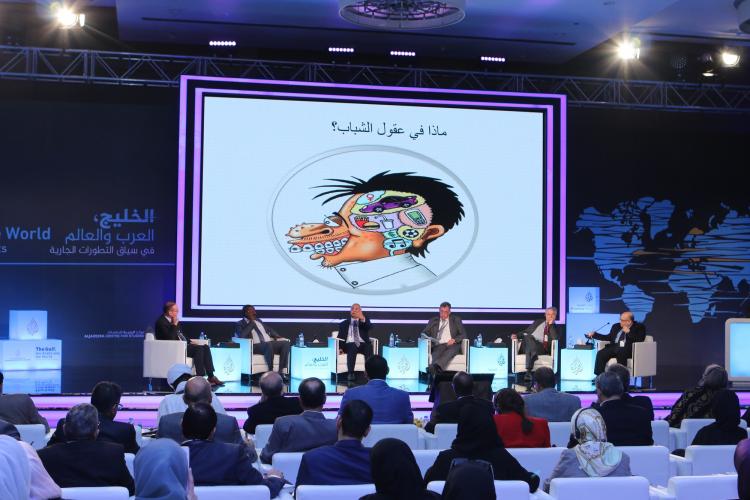The third session of the 12th Al Jazeera Forum addressed a key question: Will social and economic crises trigger a second wave of change in the region? It also discussed the extent to which social revolutions are linked to decline in reform in Arab societies, along with social phenomena that may end in an explosion, such as poverty, unemployment, the denial of rights and political authoritarianism.
The session featured Mohamed Mahjoub Haroon, Professor of Social Science at the University of Khartoum; Hmoud Al-Olimat, Professor of Sociology at Qatar University; Haoues Taguia, Researcher at Al Jazeera Centre for Studies; Niccolò Rinaldi, Vice-President for the Alliance of Liberals and Democrats for Europe (ALDE) and Member of the European Parliament’s Committee on International Trade (INTA); and Hamed Abdelmajed, Visiting Professor of Political Science at the School of Oriental and African Studies, University of London.
During his contribution, Haroon argued that the expansion of phenomena such as urbanism, youth, and commercialisation may cause an eruption and bring about change in the Arab societies. "These three variables," he said, "are capable of exacerbating conditions in any society, and the political elites must be aware of the challenges that need to be addressed as soon as possible in order to avoid a second wave of uprisings and popular revolutions."
Al-Olimat spoke of freedoms in the Arab world amid the grave conditions it currently faces, with unemployment among Arab youth increasing substantially. "What can we expect aside from an upsurge? Unless conditions are improved, [the youth] may become tools for extremism."
Al-Olimat referred to the conditions of education in the Arab world, affirming: "There is a discrepancy between the output of education and the needs of the labour market, let alone the spread of a number of social phenomena such as homelessness, poverty and the increasing pressures on families.” He alluded that these phenomena affect the society itself and generate a state of instability and inequality as well as immense disparities between the rich and poor.
Abdelmajed said that change is possible although uncertain and dependent on particular analyses and variables. He added that the economic and social factors alone are not enough to bring about change in the coming period. “In most cases, history does not repeat itself”, he said. He explained that although the wave of the Arab revolutions had economic and social factors, the political factor and failures are the real cause of the revolutions.
Taguiam however, revealed his belief that the push for change will gain force with the growth of the population and its needs alongside the increasing number of desperate youth willing to fight for their future. He pointed to the increase in unemployment rates, ranging between 25% and 30% among high school graduates, a factor which may cause further protests.
Rinaldi indicated that is difficult to predict new changes in the region, noting that change takes time. He mentioned unemployment, the deterioration of education and the percentage of youth in the population as some of the causes of social anger in the region. Rinaldi pointed out that the problem lies in the absence of a political space for change to occur rationally, as access to politics and communication between institutions are limited and corruption and unaccountability prevail.


